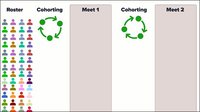More than half of America’s K–3 students aren’t reading at grade level. That’s an alarming statistic on its own, but when you pair it with the reality that 54% of adults also read below a sixth-grade level, it’s clear that we’re facing a multi-generational literacy crisis. As a former elementary school teacher and now Vice President of Education at OverDrive, I’ve seen firsthand how these challenges impact students and families in the classroom and at home.
But there’s also good news: We’re learning more than ever about how to support literacy development, thanks to research from the science of reading and evolving educational tools. One of the most promising—and accessible—tools we have is also one that many families already enjoy: audiobooks.
Why Summer Reading Matters
Every educator dreads the “summer slide”: the learning loss that can occur when students go two or three months without engaging with academic material. But summer reading shouldn’t be just about avoiding regression. It should also be about discovering joy.
When I taught first through third grade, I saw the power of summer reading not just to maintain skills, but to build identity as readers. Summer is a chance for students to explore books that reflect their interests and passions, without the pressure of assessments. That intrinsic motivation lays the groundwork for more confident, capable readers in the fall.
School librarians play a huge role here. Before summer break begins, they can guide students toward books that match their interests, whether that’s graphic novels, fantasy adventures, or heartwarming animal stories. Helping students find that “can’t-put-it-down” book can be the spark that keeps them reading independently.
Public librarians are essential too. Many already run summer reading programs for fun, prizes, and pizza. But I encourage them to make audiobooks a bigger part of those initiatives. Audiobooks aren’t just an alternative to print—they are a gateway. They offer a low-pressure way for struggling readers to engage with language, vocabulary, and storytelling, while also providing shared experiences that can strengthen family bonds.
Audiobooks Build Literacy for the Whole Family
We often talk about reading in the context of children—but literacy and learning doesn’t stop at 18. And when parents face their own challenges with reading, it can deeply affect how they support their child’s learning journey.
Audiobooks provide an on-ramp for parents who may struggle with traditional reading. They allow adults to access stories and information in a format that doesn’t require strong decoding skills. And in doing so, they model a love of literature for their children. Whether it’s listening together during a car ride or while making dinner, audiobooks can transform everyday moments into shared opportunities for learning.
And the benefits go beyond enjoyment. Listening to audiobooks supports language development, improves listening comprehension, and exposes listeners to complex vocabulary and sentence structures—all critical components of literacy.
Libraries’ digital offerings like ebooks and audiobooks promote access to stories. Not every household has shelves of books, but most have access to a phone, tablet, or computer.
Setting Up for Back-to-School Success
The return to school each fall comes with excitement and, for many students, a bit of academic anxiety. One of the best ways to ease that transition is to keep their brains engaged over the summer. When students have continued reading—even just 15–20 minutes a day—they come back with stronger comprehension skills, better vocabulary, and a more confident mindset.
But more importantly, they come back believing they’re readers. That self-perception matters. It shapes how they participate in class, how they take on new challenges, and how they persist when they stumble.
And again, audiobooks play a critical role here. For emerging readers who may not yet have the fluency to tackle grade-level texts independently, audiobooks provide access. They allow those students to experience rich, age-appropriate literature and discuss it with their peers when school resumes, building both academic and social confidence.
A Lifelong Journey
At OverDrive, we’re focused not just on helping students build foundational literacy, but on keeping people reading long after they leave school. That means making reading flexible and accessible, and something that fits into real lives. Audiobooks are perfect for this. You can listen while folding laundry, walking the dog, or commuting to work. For many adults, audiobooks aren’t just a convenience; they’re a lifeline back to literacy.
Whether you’re a librarian, educator, parent, or reader yourself, the goal is the same: to foster a lifelong love of stories. Because reading isn’t just a skill—it’s a pathway to opportunity, empathy, and human connection.
Final Thoughts
As we look toward a new school year (already?), let’s not lose sight of what really matters. Literacy is the foundation of everything we hope for our students and our society. And while we still face serious challenges, we also have powerful tools at our disposal.
Including audiobooks. They might not solve every problem, but they offer something precious: a way in. A way for children to fall in love with stories. A way for parents to reconnect with reading. A way for families to grow together.
Whatever you’re reading, and whether you’re reading with your eyes or ears, you know that the magic of storytelling remains the same. Let’s make sure every child—and every parent—gets a chance to experience it.
About the author
Renee Davenport is Vice President of Education at OverDrive.











